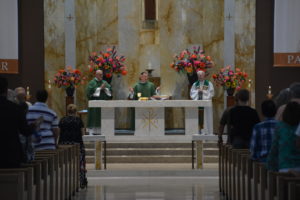To the Catholic Biblical Federation: pastoral effort to ensure the centrality of the Word of God in the life of the Church
By VISarchive 02
Vatican City, 19 June 2015 (VIS) – This morning in the Consistory Hall Pope Francis received the members of the Catholic Biblical Federation (CBF), which has recently elected Cardinal Luis Antonio Tagle, metropolitan archbishop of Manila, Philippines, as its new president. The Federation is currently holding its tenth plenary assembly dedicated to the theme “That which we have seen and heard we proclaim also to you”, drawn from the First Epistle of St. John; reflecting on the Sacred Scripture as the source of evangelisation, it commemorates the fiftieth anniversary of the promulgation of the dogmatic Constitution on the Divine Revelation Dei Verbum.
“To be able to proclaim the word of truth, we ourselves must have had the experience of the Word: we must have listened, contemplated, almost touched it with our own hands”, writes the Holy Father in the discourse he handed to those present. “Christians, who are the People of God, ‘that you may proclaim the excellencies of him’, must, as the dogmatic Constitution on Divine Revelation Dei Verbum suggests, first of all venerate, read, listen, proclaim, preach, study and spread the Word of God. The Church, who proclaims the Word every day, receiving nourishment and inspiration from it, makes herself the beneficiary and excellent witness of the efficiency and strength inherent in that same Word of God. Neither we, nor our efforts, but rather the Holy Spirit works through those who dedicate themselves to pastoral ministry, and He does the same for the listeners, preparing them to listen to the Word and to receive its message of life”.
Referring to the anniversary of Dei Verbum and the timeliness of dedicating the plenary assembly to the relationship between the Scriptures and evangelisation, Francis mentions that in 1986 St. John Paul II had invited the CBF to undertake a careful rereading of the dogmatic Constitution, applying its principles and implementing its recommendations. The Synod of Bishops on the Word of God in the life and mission of the Church in 2008 offered another important opportunity for reflecting on its application. He adds, “Likewise today I would like to invite you to go ahead with this work, always taking into consideration the value of the treasure of the Conciliar Constitution, as well as the subsequent Magisterium, while you communicate the joy of the Gospel to the furthest confines of the world, obeying the missionary mandate”.
“However, there are places where the Word of God has not yet been proclaimed or, although proclaimed, has not been received as the Word of salvation”, the Pope remarks. “There are places where the Word of God is emptied of its authority. The lack of the support or vigour of the Word leads to a weakening of the Christian communities of ancient tradition and curbs the spiritual growth and missionary fervour of the young Churches. We are all responsible if ‘the message will run the risk of losing its freshness and will cease to have the freshness of the Gospel’. However, it remains valid to encourage a special pastoral effort to emphasise the central position of the Word of God in ecclesial life, promoting the Biblical inspiration of all pastoral ministry. We must ensure that the habitual activities of all Christian communities, in the parishes, associations and movements, truly have at heart the personal encounter with Christ communicated to us in His Word since, as St. Jerome teaches, ‘ignorance of the Scriptures is ignorance of Christ’”.
“The mission of the servants of the Word – bishops, priests, men and women religious and laypeople – is that of promoting and favouring this encounter, which inspires faith and transforms life; therefore I pray, in the name of all the Church, that you may fulfil your mandate: ensuring ‘that the message of the Lord may spread rapidly and be honoured’, until the day of Jesus Christ”.
Source:: Vatican Information Service
Categories
From the Desk of Fr. JohnSs. Peter & Paul NewsU.S. Conf. of Catholic BishopsVatican Information ServiceWhat's HappeningUpcoming Events



